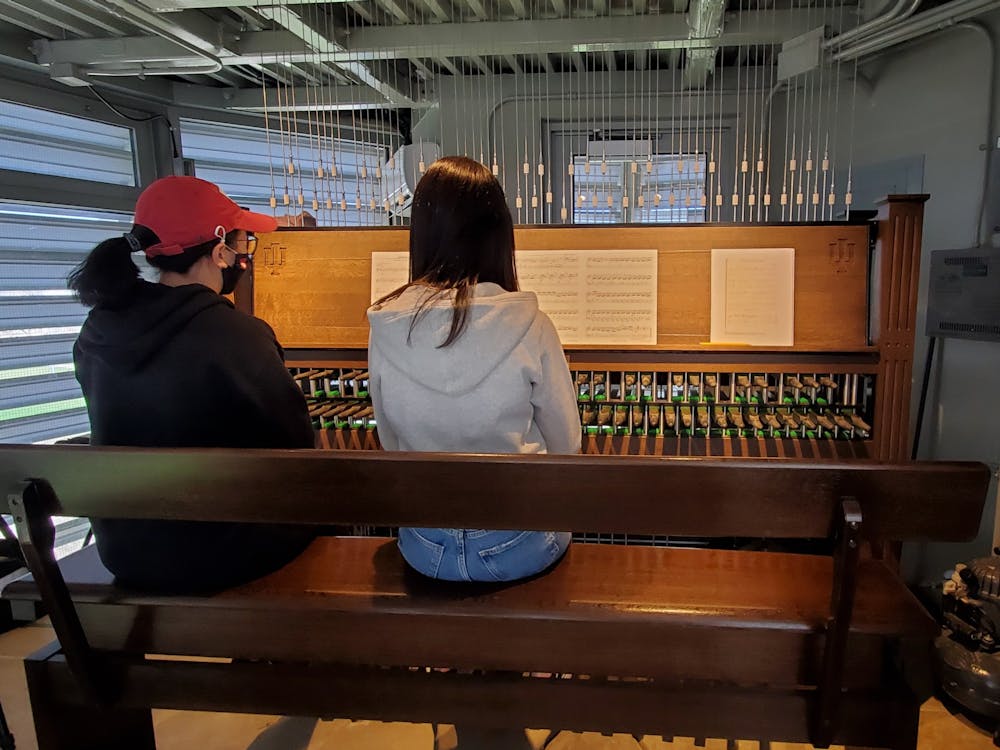Lynnli Wang, a graduate student in organ performance, performs the carillon at noon every Saturday for “Meet Me at the Metz,” sponsored by the Jacobs School of Music Organ Department. A daughter of Taiwanese immigrants, Wang decided to dedicate the March 27 recital to the #stopasianhate movement.
Last week’s shootings in three Atlanta spas has emphasized the continued existence of violence directed toward the Asian American Pacific Islander community. The hashtag #stopasianhate began trending on social media to call for allyship and protest injustice and hate crimes against AAPI residents.
“I feel really lucky that I have this platform,” Wang said. “I feel like it is my responsibility to use it as a means of demonstrating solidarity and providing hope in a time where a lot of us are going through and still processing this horrific and heartbreaking surge in violence against Asian Americans and Pacific Islanders across the U.S.”
Wang and 3 of her students sat at the top of the Arthur R. Metz Bicentennial Grand Carillon, located in the IU Arboretum, and played a repertoire of music from a diverse set of composers. Around the room, the musicians were able to see walkers, bikers and interested audience members listening to the bells being played above them.
Wang said she consulted other musicians and members of the Asian Culture Center to compile a list of works from underrepresented composers. The list included music from Asian, African, Catalonian and Haitian cultures.
Wang’s students, Ki Sacco, Nicholas Stigall and Kyounghwa Oh performed solos and duets alongside her during the recital.
She also debuted an arrangement written by one of her students Sacco, a senior in harpsichord performance and computer science. Sacco’s arrangement, Variations on Mo Li Hua, is a traditional Chinese folk song adapted for the carillon.
“I wanted to play the arrangement on the carillon because I think it’s a pretty popular Chinese folk song,” Sacco said. “I think especially during these times, it’s important to bring the beauty and the culture to the carillon.”
Stigall said he was honored to be able to play a diverse set of music in allyship of the AAPI community.
“As a white musician, being able to play music from Asian composers is one small way that I can give back and also showing that through the art of the carillon,” Stigall said.
Wang said playing music from other cultures is a great way to show allyship.
She said she encourages musicians and performers of public instruments such as the carillon to take the opportunity to play music by underrepresented composers and dedicate their performances and compositions to marginalized groups.
“I think it’s all of our responsibilities to find ways in our spheres of influence to condemn hate and create lasting social change,” Wang said. “For me, as a musician, that means I can help uplift voices and sounds that are typically underrepresented.
Wang said the carillon has a long European tradition, but the music arranged for the carillon should not be limited to European music.
“I hope that this is only the beginning to a big change that is happening,” Wang said. “I know that is not an isolated incident, I know that Jacobs has over 20% of AAPI students. I really do believe that this is a very important movement, and that it’s not too soon for change.”




